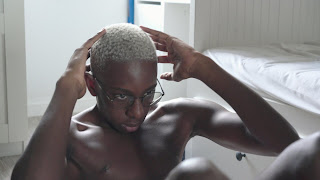TV Review - Homemade (2020)
Obviously, a lot of content online like YouTube are produced using such minimal technology. However, the past couple of years have seen Hollywood productions or feature films be produced on Apple's iPhone. The first major release was Sean Baker's Tangerine (2015). It was an independent film though. Steven Soderbergh's Unsane (2018) was a more mainstream release. Soderbergh also had High Flying Bird (2019), which was also shot on an iPhone but was mostly overlooked. Because Apple has improved things greatly, the look of the video here is not much of a step down from those films.
The idea of filmmakers forced to tell stories or make content, while limited to their homes, might be more profound or revolutionary or even innovative, if Jafar Panahi hadn't existed. Panahi is an Iranian filmmaker who was arrested in 2010. He was threatened with a six-year prison sentence, but had to suffer a house arrest and ban on making films at all. However, Panahi was still able to direct a project called This Is Not a Film (2011). Considering all the restrictions on Panahi, the fact that he was able to create his 2011 critical darling is more astonishing and amazing that anything here.This Is Not a Film is essentially a documentary and when it comes to films that are made exclusively in a person's home, documentaries are usually what they are. This is obviously not a thing that Panahi invented. His restrictions are unique to him and he's been showing the world for the better part of a decade what these 17 filmmakers here are only now having to do. However, the idea of "home movies" goes back nearly a hundred years. Ever since the advent of 8mm safety film in 1932, people have been shooting footage in their homes of their family and friends. Super 8 in 1965 and VHS in 1976 pushed family videos or home movies even more.
Capturing the Friedmans (2003), Tarnation (2003), Exit Through the Gift Shop (2010) and Amy (2015) are some examples of how home movies can be turned into a theatrical feature. Those features were cobbled together from footage that had been filmed years or even decades prior. The films here aren't cobbled and the footage isn't decades old. It's all contemporaneous. If a person had the ability to film their family for posterity but then show it immediately to a global audience, this is what it would be. It would be these 17 short films, but, because these films are short, 10 minutes or less, many of them don't end up being that insightful but just glimpses into the filmmaker's home life.
A third of the short films are mostly about a filmmaker pointing the camera at their children and following those youngsters while they do random and cute things. Of those, Rachel Morrison's is the best. Morrison made history three years ago when she became the first woman and the first queer woman to be nominated for Best Cinematography at the 90th Academy Awards for her work on Mudbound (2017). Her short, which is a letter to her 5-year-old, Wiley, is very beautiful and tear-inducing. Chinese-Canadian, Johnny Ma did a short that was basically a letter to his mom, but he features his children in a way that's also just as beautiful.
Over half of the short films are fictionalized and clearly scripted to some degree. Of those, the one that I would put at the top is the one by Paolo Sorrentino. Sorrentino is an Italian filmmaker whose work The Great Beauty (2013) won the Oscar for Best Foreign Language Film at the 86th Academy Awards. Recently, he did HBO's The Young Pope (2016) and HBO's The New Pope (2019). His short, also set in Vatican City, is an imagined conversation between presumably Pope Francis and Queen Elizabeth II, if the two were quarantined together due to the coronavirus. It is a brilliant, funny and insightful dialogue, done with stop-motion animation using figurines of both European leaders.The second, scripted short here that I thought was notably good was by Pablo Larraín. It focuses on an elderly man using a computer to video-chat with a middle-aged woman. He rambles on and on, professing his over-the-top love, as she says nothing. It builds to a great conclusion that reveals how the quarantine may or may not affect how people see relationships as a result. It was surprisingly entertaining. The other impressive short was by Sebastián Lelio whose work A Fantastic Woman (2018) won the Oscar for Best Foreign Language Film at the 90th Academy Awards. Lelio's short is a musical, one that was composed and choreographed all in quarantine. Honorable mention goes to the short by Ladj Ly whose work Les Misérables (2020) was nominated for Best International Feature at the 92nd Academy Awards. His short feels like an actual extension thematically from his Oscar-nominated film, but commenting on the coronavirus pandemic, as it affects impoverished black people.
Rated TV-MA.
Running Time: 2 hrs. and 18 mins.
Available on Netflix.















Comments
Post a Comment